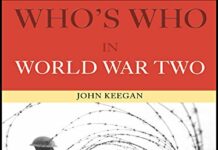
Ebook Info
- Published: 2004
- Number of pages: 304 pages
- Format: PDF
- File Size: 1.93 MB
- Authors: John Keegan
Description
The 2003 Iraq war remains among the most mysterious armed conflicts of modernity. In The Iraq War, John Keegan offers a sharp and lucid appraisal of the military campaign, explaining just how the coalition forces defeated an Iraqi army twice its size and addressing such questions as whether Saddam Hussein ever possessed weapons of mass destruction and how it is possible to fight a war that is not, by any conventional measure, a war at all.Drawing on exclusive interviews with Donald Rumsfeld and General Tommy Franks, Keegan retraces the steps that led to the showdown in Iraq, from the highlights of Hussein’s murderous rule to the diplomatic crossfire that preceded the invasion. His account of the combat in the desert is unparalleled in its grasp of strategy and tactics. The result is an urgently needed and up-to-date book that adds immeasurably to our understanding of those twenty-one days of war and their long, uncertain aftermath.
User’s Reviews
Reviews from Amazon users which were colected at the time this book was published on the website:
⭐`The Iraq War’ by the eminent English military historian and journalist, John Keegan is a model of reflective reporting on a recent major historical event, bringing to bear all of Keegan’s insight into Anglo-American history and military practice.For starters, I strongly disagree with those reviewers who felt Keegan gives us too much background for at least two reasons. First, the actual military campaign was so short, a narrative of it would hardly fill a book half this size. And second, the background is much more interesting and much less well known to those of us who followed every move of the Third Infantry division and the First Marine expeditionary force on CNN day by day from Kuwait to Baghdad.The most immediate lesson I got from this book are the fact that the Central Command commander, General Tommy Franks is as good or better a commander than his colleague commander of the 1991 Gulf War, `Stormin Norman Schwarzkopf’. If Franks impressed Keegan who has studied and analyzed every major conflict in the 20th century, I have no doubt that Franks was a good man for the military task at hand. A corollary lesson is that for this immediate military task, Franks did in fact have enough troops to accomplish the immediate capitulation of Iraqi armed forces. This does not mean there were enough coalition forces to nail things down after that initial success and it certainly does not mean that Frank’s civilian superiors in Washington really understood the Iraqi situation either before the war began or after the coalition gained nominal control of the country.The most interesting aspects of Keegan’s summary of the actual combat was the fact that the regular Iraqi troops simply melted away with the approach of American or British heavy units, the heaviest resistance came from neither regular troops nor the elite Republican Guard, but from `fedayeen’ irregulars, many of whom were actually Islamic fanatics from neighboring countries such as Syria. The native Iraqis were so uninterested in the war that civilians routinely wandered into combat areas and were often mistaken for fedayeen fanatics. Another interesting aspect of Keegan’s narrative of the combat was his characterization of the overwhelming superiority of American and UK troops over their Iraqi opponents. The Iraqi equipment bought from the Soviets was at least two generations behind the allied gear and the third and fourth rate troops were simply no match for the elite Marines, Airborne Divisions, and first line 3rd Infantry division (which is actually more like an Armored division of World War II days).As an eminently balanced reporter and historian, I was very happy to see his outsider’s assessment of the American troops and commanders, especially of those periods at the end of March, for example, when so many commentators were prophesying doom and gloom at what was nothing more than a holdup for a desert storm in order for supply lines to catch up with the forward troops.The really interesting stuff comes in the background chapters. One surprise was how such seemingly small events can sway the tide of history, as how the European and American public was alarmed when a western journalist was executed in Iraq, after thousands of natives were purged with not so much of a flicker of interest. Another was the influence of then Prime Minister Margaret Thatcher had on the first President Bush to consider military action against Saddam in 1991.The even more interesting material of the book is the contrast of Saddam’s generally secular regime contrasted to the fundamentalist Islam regimes of Iran and other Middle Eastern countries. Keegan does not draw any significant conclusions about this, but he very effectively paints a picture that makes cooperation between Iraq and Al Quaida seem very unlikely.Possibly the single most interesting observation comes on page 54 where Keegan explains the mystery of why Islam, which was the leading source of learning and thought for over 700 years, turns its back on independent reasoning and the future and directs the faithful to be more oriented to the past. This is at the same time (15th and 16th centuries) when the Western Christian church was accommodating reason and scientific inquiry, leading to the technological prominence of Western Europe as time went on.People who are looking for strong, concrete reasons for why we should or should not have invaded Iraq in 2003 will not find them in this book, although Keegan does offer plenty of factual material to help people make up their own minds on these issues. But, even Keegan admits that he does not yet have the whole story and leaves some questions open at the very end.Any balanced view of the invasion of Iraq should take this narrative into account.
⭐John Keegan is the Defense Editor of The Daily Telegraph of London; he writes knowledgably and fluently about the second Gulf War and its antecedents.The first half of the book is the history of Iraq from the time of Mesopotamia, with an emphasis on the origins of Saddam Hussein and his Ba’ath party. There is a secular history of the modern Middle East, parallel to and different from the history of the rise of Islamic terrorism. In Iraq specifically, the secular history is more important to understanding the country’s development and the people whom it is hoped will be able to create a stable and peaceful nation out of the rubble and turmoil that presently exists.Keegan gives an interesting, offshore critique of the neo-con policies in this historical context, such as pre-emption, the belief in the salutary effect of implanting democracy, particularity (i.e., “A city that is set on an hill …”) and Zionism. He also provides a very interesting analysis of European attitudes toward the war. Eastern Europe supported US policy because they saw Stalinism in Saddam, which they knew and hated. Western Europe by and large protested, the root of their disagreement being what Keegan calls “Olympianism”: the strong belief that supra-national institutions can provide the solution to conflicts between states, the EU locally and the UN globally. Keegan describes this as the belief that “laws will be obeyed by their mere promulgation”.Keegan gives a stirring description of Tony Blair’s speech before The Commons in March 2003 that turned back a vote of no-confidence despite the defection of many in his own party and paved the way for Britain’s active participation.The second half of the book is a somewhat detailed description of the assaults by the US forces up the river valleys and into Baghdad, and the British forces investing and taking Basra. The difference in approach between the first and second Gulf Wars is analyzed.Of more importance than the military maneuvers is the issue of the behavior of the Iraqi army and populace, which Keegan describes as “mysterious” and which he feels has an important bearing on the difficult security situation after the end of formal hostilities. The mystery is that the armies didn’t really fight, they mostly deserted and vanished back into their homes; and the general population often behaved as though they were on a movie set, going about their daily business and ignoring the battles.The decision to disband the military and the police and to exclude Ba’ath members is criticized and is held partly responsible for the effective morphing of the foreigners and fedayeen from irregular soldiers to looters to urban guerillas, recruiting numerous demobilized and unemployed soldiers. The British are credited with more experience in such situations based on their years of colonial rule, which led them to the more practical approach of establishing law and order rather than worrying about the ideological objective of immediately establishing democratic institutions.The book is interesting and worth reading. It fails, however, to pursue the “mystery” which it introduces at the beginning; the book ends with very little thought given to its causes or its solution.
⭐This is as usual a very well researched book by a really good Historian. It details a lot of Iraqi history and covers the war(s) very well.Where it could have been better would have been if Mr Keegan had waited to write it. He could have brought in the disaster that the post 2003 iraq became. He would have handled that with great insight.
⭐Historien militaire britannique réputé, John Keegan signe en 2004 un ouvrage de synthèse sur la guerre en Irak, revu et corrigé dans cette édition de 2005. Le titre est trompeur car près de la moitié de l’ouvrage est en fait consacrée à l’histoire de l’Irak au XXème siècle et jusqu’à la guerre de 2003, avec un focus sur le régime de Saddam Hussein. Seule la deuxième moitié aborde l’invasion de 2003 par les Américains et les Britanniques.Keegan explique combien Saddam Hussein représentait une menace pour la stabilité du Moyen-Orient, et ce dès sa prise de pouvoir effective en 1979 et la guerre Iran-Irak (1980-1988) qui suit. Ceci étant, il rappelle aussi que la décision de l’administration américaine de dissoudre l’armée et la police irakienne après la chute du régime en 2003 a sans doute été une erreur incontestable. Si les grandes lignes de la campagne de 2003 sont bien retracées, je regrette parfois que Keegan n’entre pas plus dans le détail des opérations. Le point de vue politique est par contre, comme le montre les deux exemples ci-dessus, assez balancé.Au niveau des moins aussi, les cartes des ouvrages de Keegan mériteraient un sérieux lifting, car elles commencent à dater au niveau de la présentation. Si l’ordre de bataille de la coalition est présent, la bibliographie est plus que sommaire et surprend un peu de la part de Keegan (14 titres, une misère). Au final, c’est un peu décevant.戦略の歴史 抹殺,征服技術の変遷の筆者による英国人の立場からみたイラク戦争。オスマン=トルコ時代からの歴史的経緯と英国の中東への関与から筆を起こす。戦争の経緯については米国の作戦と英国の作戦を対比し、その背景を考察。
⭐
Keywords
Free Download The Iraq War in PDF format
The Iraq War PDF Free Download
Download The Iraq War 2004 PDF Free
The Iraq War 2004 PDF Free Download
Download The Iraq War PDF
Free Download Ebook The Iraq War





